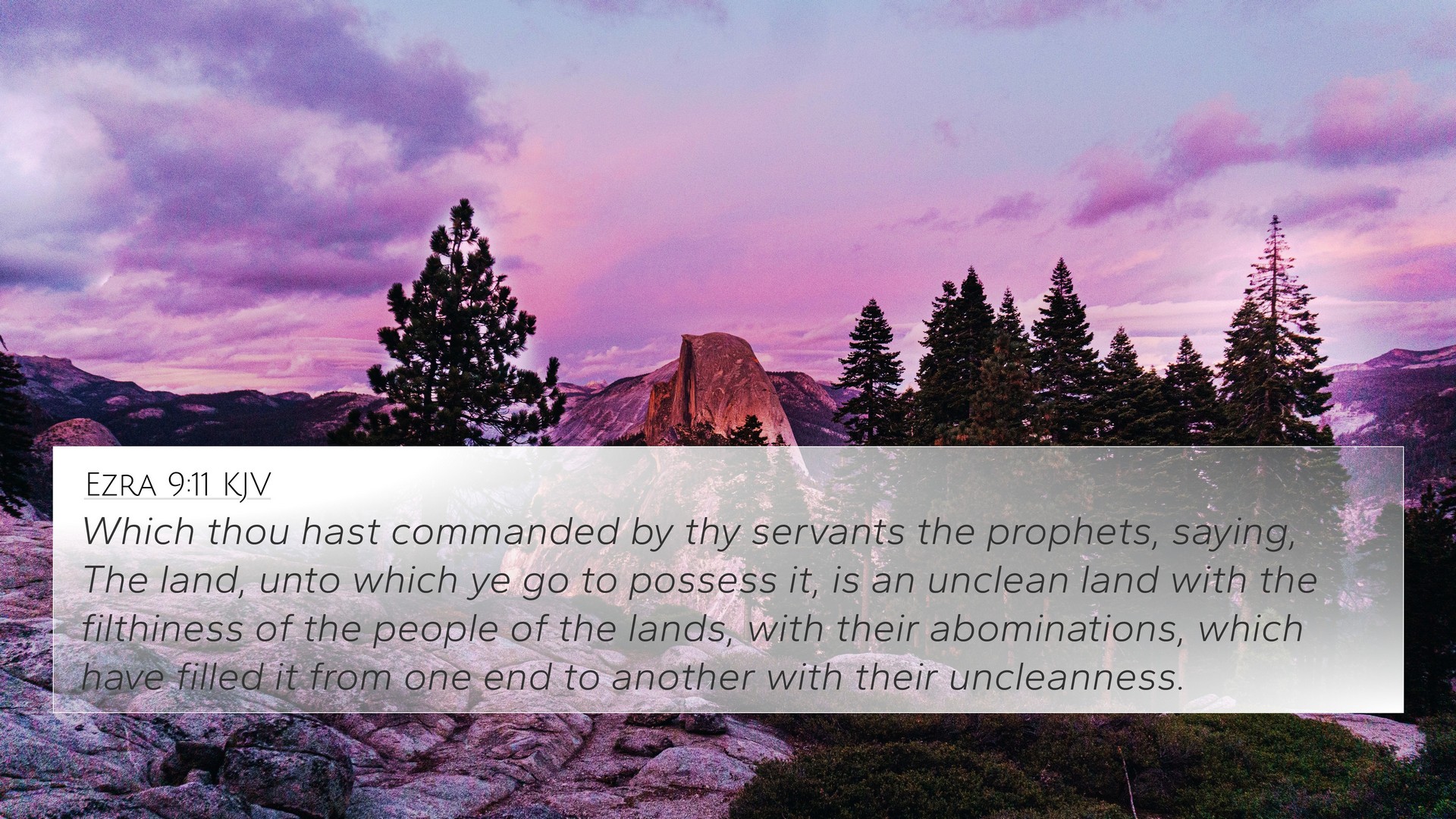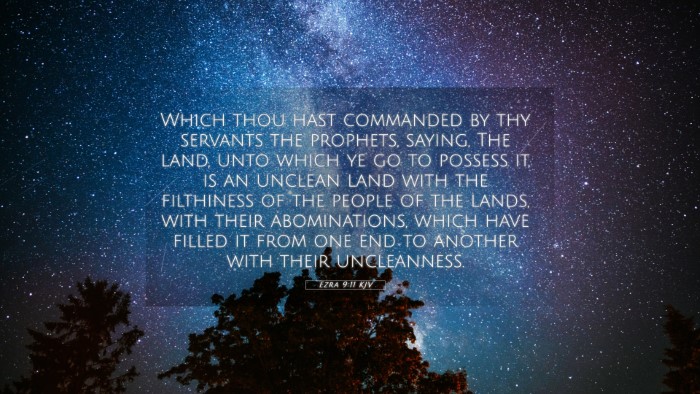Old Testament
Genesis Exodus Leviticus Numbers Deuteronomy Joshua Judges Ruth 1 Samuel 2 Samuel 1 Kings 2 Kings 1 Chronicles 2 Chronicles Ezra Nehemiah Esther Job Psalms Proverbs Ecclesiastes Song of Solomon Isaiah Jeremiah Lamentations Ezekiel Daniel Hosea Joel Amos Obadiah Jonah Micah Nahum Habakkuk Zephaniah Haggai Zechariah MalachiEzra 9:11 Similar Verses
Ezra 9:11 Cross References
Which thou hast commanded by thy servants the prophets, saying, The land, unto which ye go to possess it, is an unclean land with the filthiness of the people of the lands, with their abominations, which have filled it from one end to another with their uncleanness.
Uncover the Rich Themes and Topics of This Bible Verse
Listed below are the Bible themes associated with Ezra 9:11. We invite you to explore each theme to gain deeper insights into the Scriptures.
Ezra 9:11 Cross Reference Verses
This section features a detailed cross-reference designed to enrich your understanding of the Scriptures. Below, you will find carefully selected verses that echo the themes and teachings related to Ezra 9:11 KJV. Click on any image to explore detailed analyses of related Bible verses and uncover deeper theological insights.

Leviticus 18:24 (KJV) »
Defile not ye yourselves in any of these things: for in all these the nations are defiled which I cast out before you:

Ezra 6:21 (KJV) »
And the children of Israel, which were come again out of captivity, and all such as had separated themselves unto them from the filthiness of the heathen of the land, to seek the LORD God of Israel, did eat,
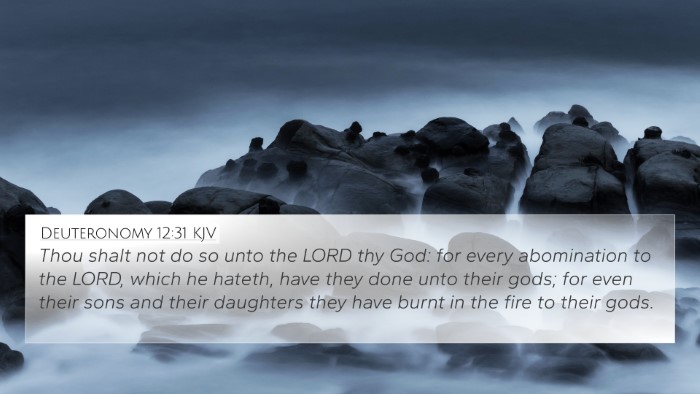
Deuteronomy 12:31 (KJV) »
Thou shalt not do so unto the LORD thy God: for every abomination to the LORD, which he hateth, have they done unto their gods; for even their sons and their daughters they have burnt in the fire to their gods.

Deuteronomy 18:12 (KJV) »
For all that do these things are an abomination unto the LORD: and because of these abominations the LORD thy God doth drive them out from before thee.
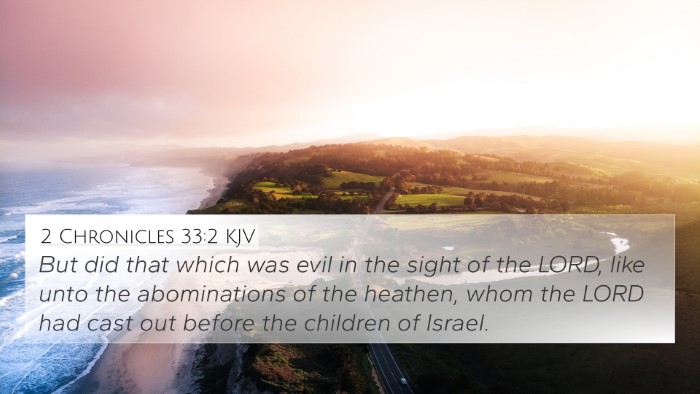
2 Chronicles 33:2 (KJV) »
But did that which was evil in the sight of the LORD, like unto the abominations of the heathen, whom the LORD had cast out before the children of Israel.
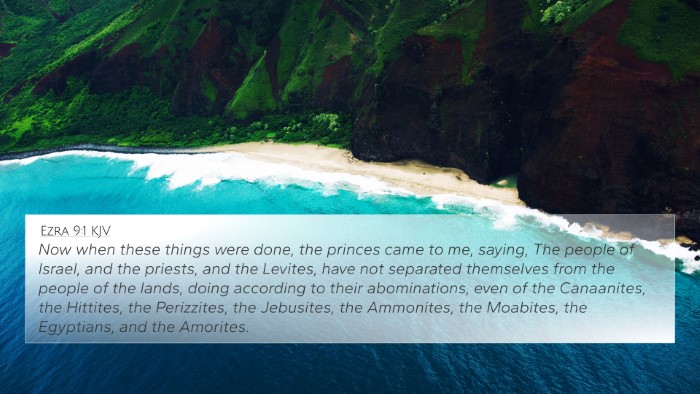
Ezra 9:1 (KJV) »
Now when these things were done, the princes came to me, saying, The people of Israel, and the priests, and the Levites, have not separated themselves from the people of the lands, doing according to their abominations, even of the Canaanites, the Hittites, the Perizzites, the Jebusites, the Ammonites, the Moabites, the Egyptians, and the Amorites.
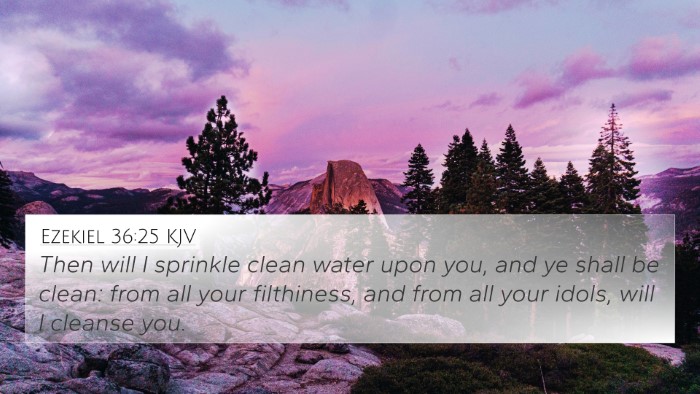
Ezekiel 36:25 (KJV) »
Then will I sprinkle clean water upon you, and ye shall be clean: from all your filthiness, and from all your idols, will I cleanse you.

2 Corinthians 7:1 (KJV) »
Having therefore these promises, dearly beloved, let us cleanse ourselves from all filthiness of the flesh and spirit, perfecting holiness in the fear of God.
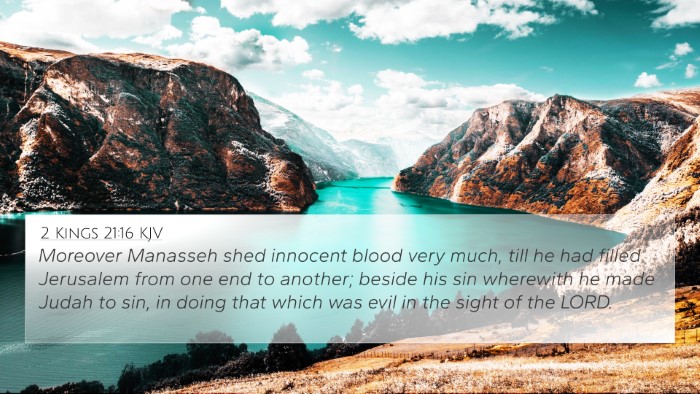
2 Kings 21:16 (KJV) »
Moreover Manasseh shed innocent blood very much, till he had filled Jerusalem from one end to another; beside his sin wherewith he made Judah to sin, in doing that which was evil in the sight of the LORD.
Ezra 9:11 Verse Analysis and Similar Verses
Ezra 9:11 - Summary and Interpretation
Ezra 9:11 states: "Which thou hast commanded by thy servants the prophets, saying, The land, unto which ye go to possess it, is an unclean land, with the filthiness of the people of the lands, with their abominations, which have filled it from one end to another with their uncleanness."
This verse serves as a critical reminder of the importance of purity in the covenant community and highlights the consequences of mingling with surrounding nations that are steeped in idolatry and moral corruption.
Meaning and Insights from Public Domain Commentaries
Matthew Henry's Commentary
Matthew Henry emphasizes that the command given to Israel to avoid the corrupt practices of the surrounding nations is rooted in the holiness of God and the purity required of His people. He explains that the 'uncleanness' refers to both moral and ritual contamination, which can lead to judgments similar to those faced by the nations they will inhabit.
Albert Barnes' Notes
Albert Barnes notes that the warnings from the prophets were clear regarding the corruptions of the land. He points out that God, through the prophets, repeatedly instructed the people to cleanse themselves and to avoid the sins that had so profoundly tainted the land they were to enter. The underlying theme is that disobedience would lead to dire consequences for Israel.
Adam Clarke's Commentary
In his exposition, Adam Clarke highlights that the admonitions articulated by the prophets not only concern physical cleanliness but also extend to spiritual health. Clarke discusses how the 'filthiness' of the land symbolizes the moral decay present in society that can easily corrupt those who enter.
Bible Cross References
This verse connects deeply with several other scriptural passages that reinforce its themes:
- Leviticus 18:24-30 - Warns against the abominations of Canaanites.
- Deuteronomy 7:2-4 - Instructs Israel to destroy the nations and their idols.
- Jeremiah 2:7 - God laments that His people have become unclean.
- Ezra 10:11 - Calls for confession and repentance from sin.
- James 1:27 - Discusses the importance of keeping oneself unspotted from the world.
- 1 Corinthians 15:33 - "Evil communications corrupt good manners."
- 2 Corinthians 6:17 - God commands His people to separate from the unclean.
Thematic Connections and Comparative Analysis
Through cross-referencing Biblical texts, Ezra 9:11 serves to highlight key themes of holiness and the importance of maintaining purity amidst a surrounding culture that is often incompatible with God's laws. This notion is echoed in both the Old and New Testaments, providing an inter-Biblical dialogue on the necessity of spiritual vigilance.
When engaging in a cross-reference Bible study, one can explore how themes of separation from sin run throughout scripture:
- Connections between Bible verses: The concept of being set apart is consistently reiterated.
- Cross-referencing Biblical texts: Use tools for Bible cross-referencing to explore these interconnected themes.
- Bible verses that relate to each other: Note how prophetic warnings resonate with New Testament admonitions.
Conclusion
Ezra 9:11 is not just a historical record, but a relevant reminder for believers today. The themes of maintaining holiness and avoiding spiritual compromise are as applicable now as they were during Ezra's time. By understanding the connections between Bible verses like this one, a richer and deeper understanding of God's word can be achieved, providing tools for personal Bible study and sermon preparation.
Final Thought: As one studies the Word, it is crucial to engage with a Bible concordance or a cross-reference Bible study guide to unearth the wealth of interconnected truths found throughout God's Word. This approach enriches one's faith and understanding, fostering spiritual growth and discipline in living a life that honors God amidst a morally ambiguous world.